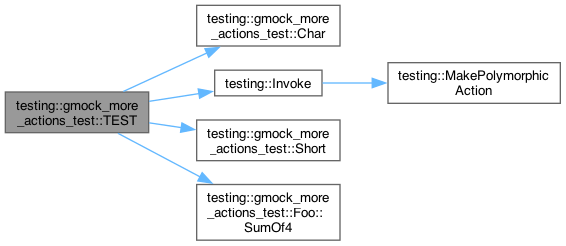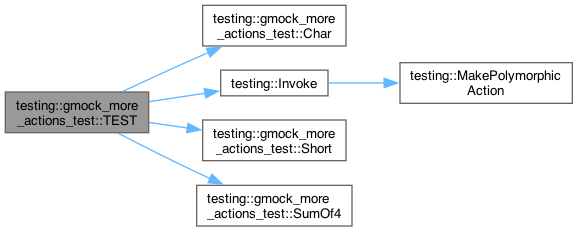Classes | |
| class | DeletionTester |
| class | Foo |
| class | NullaryFunctor |
| struct | SumOf5Functor |
| struct | SumOf6Functor |
| struct | UnaryFunctor |
| class | VoidNullaryFunctor |
Functions | |
| short | Short (short n) |
| char | Char (char ch) |
| int | Nullary () |
| void | VoidNullary () |
| bool | Unary (int x) |
| const char * | Plus1 (const char *s) |
| void | VoidUnary (int) |
| bool | ByConstRef (const std::string &s) |
| bool | ReferencesGlobalDouble (const double &x) |
| std::string | ByNonConstRef (std::string &s) |
| const char * | Binary (const char *input, short n) |
| void | VoidBinary (int, char) |
| int | Ternary (int x, char y, short z) |
| void | VoidTernary (int, char, bool) |
| int | SumOf4 (int a, int b, int c, int d) |
| int | SumOfFirst2 (int a, int b, Unused, Unused) |
| void | VoidFunctionWithFourArguments (char, int, float, double) |
| std::string | Concat4 (const char *s1, const char *s2, const char *s3, const char *s4) |
| int | SumOf5 (int a, int b, int c, int d, int e) |
| std::string | Concat5 (const char *s1, const char *s2, const char *s3, const char *s4, const char *s5) |
| int | SumOf6 (int a, int b, int c, int d, int e, int f) |
| std::string | Concat6 (const char *s1, const char *s2, const char *s3, const char *s4, const char *s5, const char *s6) |
| std::string | Concat7 (const char *s1, const char *s2, const char *s3, const char *s4, const char *s5, const char *s6, const char *s7) |
| std::string | Concat8 (const char *s1, const char *s2, const char *s3, const char *s4, const char *s5, const char *s6, const char *s7, const char *s8) |
| std::string | Concat9 (const char *s1, const char *s2, const char *s3, const char *s4, const char *s5, const char *s6, const char *s7, const char *s8, const char *s9) |
| std::string | Concat10 (const char *s1, const char *s2, const char *s3, const char *s4, const char *s5, const char *s6, const char *s7, const char *s8, const char *s9, const char *s10) |
| TEST (InvokeTest, Nullary) | |
| TEST (InvokeTest, Unary) | |
| TEST (InvokeTest, Binary) | |
| TEST (InvokeTest, Ternary) | |
| TEST (InvokeTest, FunctionThatTakes4Arguments) | |
| TEST (InvokeTest, FunctionThatTakes5Arguments) | |
| TEST (InvokeTest, FunctionThatTakes6Arguments) | |
| const char * | CharPtr (const char *s) |
| TEST (InvokeTest, FunctionThatTakes7Arguments) | |
| TEST (InvokeTest, FunctionThatTakes8Arguments) | |
| TEST (InvokeTest, FunctionThatTakes9Arguments) | |
| TEST (InvokeTest, FunctionThatTakes10Arguments) | |
| TEST (InvokeTest, FunctionWithUnusedParameters) | |
| TEST (InvokeTest, MethodWithUnusedParameters) | |
| TEST (InvokeTest, Functor) | |
| TEST (InvokeTest, FunctionWithCompatibleType) | |
| TEST (InvokeMethodTest, Nullary) | |
| TEST (InvokeMethodTest, Unary) | |
| TEST (InvokeMethodTest, Binary) | |
| TEST (InvokeMethodTest, Ternary) | |
| TEST (InvokeMethodTest, MethodThatTakes4Arguments) | |
| TEST (InvokeMethodTest, MethodThatTakes5Arguments) | |
| TEST (InvokeMethodTest, MethodThatTakes6Arguments) | |
| TEST (InvokeMethodTest, MethodThatTakes7Arguments) | |
| TEST (InvokeMethodTest, MethodThatTakes8Arguments) | |
| TEST (InvokeMethodTest, MethodThatTakes9Arguments) | |
| TEST (InvokeMethodTest, MethodThatTakes10Arguments) | |
| TEST (InvokeMethodTest, MethodWithCompatibleType) | |
| TEST (WithoutArgsTest, NoArg) | |
| TEST (WithArgTest, OneArg) | |
| TEST (ReturnArgActionTest, WorksForOneArgIntArg0) | |
| TEST (ReturnArgActionTest, WorksForMultiArgBoolArg0) | |
| TEST (ReturnArgActionTest, WorksForMultiArgStringArg2) | |
| TEST (SaveArgActionTest, WorksForSameType) | |
| TEST (SaveArgActionTest, WorksForCompatibleType) | |
| TEST (SaveArgPointeeActionTest, WorksForSameType) | |
| TEST (SaveArgPointeeActionTest, WorksForCompatibleType) | |
| TEST (SaveArgPointeeActionTest, WorksForLinkedPtr) | |
| TEST (SetArgRefereeActionTest, WorksForSameType) | |
| TEST (SetArgRefereeActionTest, WorksForCompatibleType) | |
| TEST (SetArgRefereeActionTest, WorksWithExtraArguments) | |
| TEST (DeleteArgActionTest, OneArg) | |
| TEST (DeleteArgActionTest, TenArgs) | |
| TEST (SetArrayArgumentTest, SetsTheNthArray) | |
| TEST (SetArrayArgumentTest, SetsTheNthArrayWithEmptyRange) | |
| TEST (SetArrayArgumentTest, SetsTheNthArrayWithConvertibleType) | |
| TEST (SetArrayArgumentTest, SetsTheNthArrayWithIteratorArgument) | |
| TEST (ReturnPointeeTest, Works) | |
Variables | |
| bool | g_done = false |
| const double | g_double = 0 |
Function Documentation
◆ Binary()
| const char * testing::gmock_more_actions_test::Binary | ( | const char * | input, |
| short | n ) |
Definition at line 108 of file gmock-more-actions_test.cc.
◆ ByConstRef()
| bool testing::gmock_more_actions_test::ByConstRef | ( | const std::string & | s | ) |
Definition at line 97 of file gmock-more-actions_test.cc.
◆ ByNonConstRef()
| std::string testing::gmock_more_actions_test::ByNonConstRef | ( | std::string & | s | ) |
Definition at line 102 of file gmock-more-actions_test.cc.
◆ Char()
|
inline |
Definition at line 73 of file gmock-more-actions_test.cc.
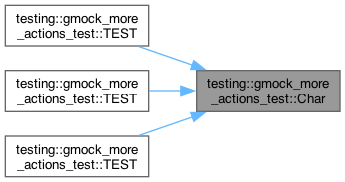
◆ CharPtr()
|
inline |
Definition at line 279 of file gmock-more-actions_test.cc.
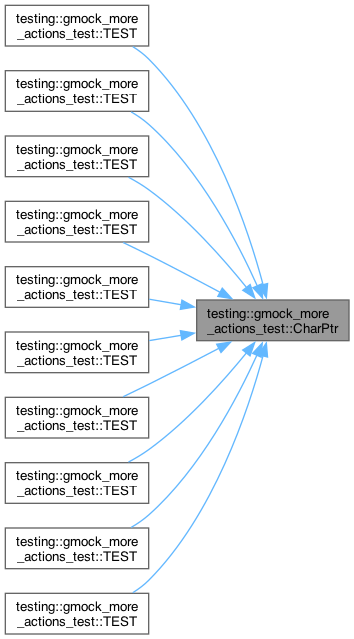
◆ Concat10()
| std::string testing::gmock_more_actions_test::Concat10 | ( | const char * | s1, |
| const char * | s2, | ||
| const char * | s3, | ||
| const char * | s4, | ||
| const char * | s5, | ||
| const char * | s6, | ||
| const char * | s7, | ||
| const char * | s8, | ||
| const char * | s9, | ||
| const char * | s10 ) |
Definition at line 173 of file gmock-more-actions_test.cc.

◆ Concat4()
| std::string testing::gmock_more_actions_test::Concat4 | ( | const char * | s1, |
| const char * | s2, | ||
| const char * | s3, | ||
| const char * | s4 ) |
Definition at line 122 of file gmock-more-actions_test.cc.
◆ Concat5()
| std::string testing::gmock_more_actions_test::Concat5 | ( | const char * | s1, |
| const char * | s2, | ||
| const char * | s3, | ||
| const char * | s4, | ||
| const char * | s5 ) |
Definition at line 135 of file gmock-more-actions_test.cc.
◆ Concat6()
| std::string testing::gmock_more_actions_test::Concat6 | ( | const char * | s1, |
| const char * | s2, | ||
| const char * | s3, | ||
| const char * | s4, | ||
| const char * | s5, | ||
| const char * | s6 ) |
Definition at line 150 of file gmock-more-actions_test.cc.
◆ Concat7()
| std::string testing::gmock_more_actions_test::Concat7 | ( | const char * | s1, |
| const char * | s2, | ||
| const char * | s3, | ||
| const char * | s4, | ||
| const char * | s5, | ||
| const char * | s6, | ||
| const char * | s7 ) |
Definition at line 155 of file gmock-more-actions_test.cc.

◆ Concat8()
| std::string testing::gmock_more_actions_test::Concat8 | ( | const char * | s1, |
| const char * | s2, | ||
| const char * | s3, | ||
| const char * | s4, | ||
| const char * | s5, | ||
| const char * | s6, | ||
| const char * | s7, | ||
| const char * | s8 ) |
Definition at line 161 of file gmock-more-actions_test.cc.

◆ Concat9()
| std::string testing::gmock_more_actions_test::Concat9 | ( | const char * | s1, |
| const char * | s2, | ||
| const char * | s3, | ||
| const char * | s4, | ||
| const char * | s5, | ||
| const char * | s6, | ||
| const char * | s7, | ||
| const char * | s8, | ||
| const char * | s9 ) |
Definition at line 167 of file gmock-more-actions_test.cc.

◆ Nullary()
| int testing::gmock_more_actions_test::Nullary | ( | ) |
Definition at line 76 of file gmock-more-actions_test.cc.
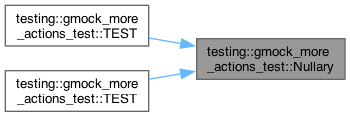
◆ Plus1()
| const char * testing::gmock_more_actions_test::Plus1 | ( | const char * | s | ) |
Definition at line 93 of file gmock-more-actions_test.cc.
◆ ReferencesGlobalDouble()
| bool testing::gmock_more_actions_test::ReferencesGlobalDouble | ( | const double & | x | ) |
Definition at line 100 of file gmock-more-actions_test.cc.
◆ Short()
|
inline |
Definition at line 72 of file gmock-more-actions_test.cc.
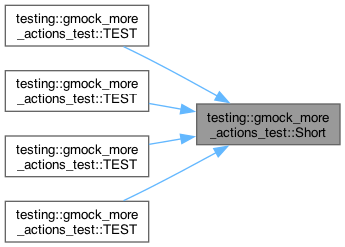
◆ SumOf4()
| int testing::gmock_more_actions_test::SumOf4 | ( | int | a, |
| int | b, | ||
| int | c, | ||
| int | d ) |
Definition at line 116 of file gmock-more-actions_test.cc.

◆ SumOf5()
| int testing::gmock_more_actions_test::SumOf5 | ( | int | a, |
| int | b, | ||
| int | c, | ||
| int | d, | ||
| int | e ) |
Definition at line 127 of file gmock-more-actions_test.cc.

◆ SumOf6()
| int testing::gmock_more_actions_test::SumOf6 | ( | int | a, |
| int | b, | ||
| int | c, | ||
| int | d, | ||
| int | e, | ||
| int | f ) |
Definition at line 140 of file gmock-more-actions_test.cc.

◆ SumOfFirst2()
Definition at line 118 of file gmock-more-actions_test.cc.

◆ Ternary()
| int testing::gmock_more_actions_test::Ternary | ( | int | x, |
| char | y, | ||
| short | z ) |
Definition at line 112 of file gmock-more-actions_test.cc.

◆ TEST() [1/47]
| testing::gmock_more_actions_test::TEST | ( | DeleteArgActionTest | , |
| OneArg | ) |
Definition at line 581 of file gmock-more-actions_test.cc.

◆ TEST() [2/47]
| testing::gmock_more_actions_test::TEST | ( | DeleteArgActionTest | , |
| TenArgs | ) |
Definition at line 590 of file gmock-more-actions_test.cc.

◆ TEST() [3/47]
| testing::gmock_more_actions_test::TEST | ( | InvokeMethodTest | , |
| Binary | ) |
Definition at line 380 of file gmock-more-actions_test.cc.

◆ TEST() [4/47]
| testing::gmock_more_actions_test::TEST | ( | InvokeMethodTest | , |
| MethodThatTakes10Arguments | ) |
Definition at line 455 of file gmock-more-actions_test.cc.

◆ TEST() [5/47]
| testing::gmock_more_actions_test::TEST | ( | InvokeMethodTest | , |
| MethodThatTakes4Arguments | ) |
◆ TEST() [6/47]
| testing::gmock_more_actions_test::TEST | ( | InvokeMethodTest | , |
| MethodThatTakes5Arguments | ) |
◆ TEST() [7/47]
| testing::gmock_more_actions_test::TEST | ( | InvokeMethodTest | , |
| MethodThatTakes6Arguments | ) |
◆ TEST() [8/47]
| testing::gmock_more_actions_test::TEST | ( | InvokeMethodTest | , |
| MethodThatTakes7Arguments | ) |
Definition at line 418 of file gmock-more-actions_test.cc.

◆ TEST() [9/47]
| testing::gmock_more_actions_test::TEST | ( | InvokeMethodTest | , |
| MethodThatTakes8Arguments | ) |
Definition at line 430 of file gmock-more-actions_test.cc.

◆ TEST() [10/47]
| testing::gmock_more_actions_test::TEST | ( | InvokeMethodTest | , |
| MethodThatTakes9Arguments | ) |
Definition at line 442 of file gmock-more-actions_test.cc.

◆ TEST() [11/47]
| testing::gmock_more_actions_test::TEST | ( | InvokeMethodTest | , |
| MethodWithCompatibleType | ) |
◆ TEST() [12/47]
| testing::gmock_more_actions_test::TEST | ( | InvokeMethodTest | , |
| Nullary | ) |
◆ TEST() [13/47]
| testing::gmock_more_actions_test::TEST | ( | InvokeMethodTest | , |
| Ternary | ) |
◆ TEST() [14/47]
| testing::gmock_more_actions_test::TEST | ( | InvokeMethodTest | , |
| Unary | ) |
◆ TEST() [15/47]
| testing::gmock_more_actions_test::TEST | ( | InvokeTest | , |
| Binary | ) |
Definition at line 247 of file gmock-more-actions_test.cc.

◆ TEST() [16/47]
| testing::gmock_more_actions_test::TEST | ( | InvokeTest | , |
| FunctionThatTakes10Arguments | ) |
Definition at line 316 of file gmock-more-actions_test.cc.

◆ TEST() [17/47]
| testing::gmock_more_actions_test::TEST | ( | InvokeTest | , |
| FunctionThatTakes4Arguments | ) |
◆ TEST() [18/47]
| testing::gmock_more_actions_test::TEST | ( | InvokeTest | , |
| FunctionThatTakes5Arguments | ) |
◆ TEST() [19/47]
| testing::gmock_more_actions_test::TEST | ( | InvokeTest | , |
| FunctionThatTakes6Arguments | ) |
◆ TEST() [20/47]
| testing::gmock_more_actions_test::TEST | ( | InvokeTest | , |
| FunctionThatTakes7Arguments | ) |
Definition at line 282 of file gmock-more-actions_test.cc.

◆ TEST() [21/47]
| testing::gmock_more_actions_test::TEST | ( | InvokeTest | , |
| FunctionThatTakes8Arguments | ) |
Definition at line 293 of file gmock-more-actions_test.cc.

◆ TEST() [22/47]
| testing::gmock_more_actions_test::TEST | ( | InvokeTest | , |
| FunctionThatTakes9Arguments | ) |
Definition at line 304 of file gmock-more-actions_test.cc.

◆ TEST() [23/47]
| testing::gmock_more_actions_test::TEST | ( | InvokeTest | , |
| FunctionWithCompatibleType | ) |
◆ TEST() [24/47]
| testing::gmock_more_actions_test::TEST | ( | InvokeTest | , |
| FunctionWithUnusedParameters | ) |
Definition at line 329 of file gmock-more-actions_test.cc.

◆ TEST() [25/47]
| testing::gmock_more_actions_test::TEST | ( | InvokeTest | , |
| Functor | ) |
◆ TEST() [26/47]
| testing::gmock_more_actions_test::TEST | ( | InvokeTest | , |
| MethodWithUnusedParameters | ) |
Definition at line 341 of file gmock-more-actions_test.cc.

◆ TEST() [27/47]
| testing::gmock_more_actions_test::TEST | ( | InvokeTest | , |
| Nullary | ) |
◆ TEST() [28/47]
| testing::gmock_more_actions_test::TEST | ( | InvokeTest | , |
| Ternary | ) |
◆ TEST() [29/47]
| testing::gmock_more_actions_test::TEST | ( | InvokeTest | , |
| Unary | ) |
Definition at line 240 of file gmock-more-actions_test.cc.

◆ TEST() [30/47]
| testing::gmock_more_actions_test::TEST | ( | ReturnArgActionTest | , |
| WorksForMultiArgBoolArg0 | ) |
Definition at line 494 of file gmock-more-actions_test.cc.
◆ TEST() [31/47]
| testing::gmock_more_actions_test::TEST | ( | ReturnArgActionTest | , |
| WorksForMultiArgStringArg2 | ) |
◆ TEST() [32/47]
| testing::gmock_more_actions_test::TEST | ( | ReturnArgActionTest | , |
| WorksForOneArgIntArg0 | ) |
◆ TEST() [33/47]
| testing::gmock_more_actions_test::TEST | ( | ReturnPointeeTest | , |
| Works | ) |
◆ TEST() [34/47]
| testing::gmock_more_actions_test::TEST | ( | SaveArgActionTest | , |
| WorksForCompatibleType | ) |
Definition at line 511 of file gmock-more-actions_test.cc.

◆ TEST() [35/47]
| testing::gmock_more_actions_test::TEST | ( | SaveArgActionTest | , |
| WorksForSameType | ) |
Definition at line 504 of file gmock-more-actions_test.cc.

◆ TEST() [36/47]
| testing::gmock_more_actions_test::TEST | ( | SaveArgPointeeActionTest | , |
| WorksForCompatibleType | ) |
Definition at line 526 of file gmock-more-actions_test.cc.

◆ TEST() [37/47]
| testing::gmock_more_actions_test::TEST | ( | SaveArgPointeeActionTest | , |
| WorksForLinkedPtr | ) |
Definition at line 534 of file gmock-more-actions_test.cc.

◆ TEST() [38/47]
| testing::gmock_more_actions_test::TEST | ( | SaveArgPointeeActionTest | , |
| WorksForSameType | ) |
◆ TEST() [39/47]
| testing::gmock_more_actions_test::TEST | ( | SetArgRefereeActionTest | , |
| WorksForCompatibleType | ) |
◆ TEST() [40/47]
| testing::gmock_more_actions_test::TEST | ( | SetArgRefereeActionTest | , |
| WorksForSameType | ) |
◆ TEST() [41/47]
| testing::gmock_more_actions_test::TEST | ( | SetArgRefereeActionTest | , |
| WorksWithExtraArguments | ) |
Definition at line 556 of file gmock-more-actions_test.cc.

◆ TEST() [42/47]
| testing::gmock_more_actions_test::TEST | ( | SetArrayArgumentTest | , |
| SetsTheNthArray | ) |
Definition at line 623 of file gmock-more-actions_test.cc.
◆ TEST() [43/47]
| testing::gmock_more_actions_test::TEST | ( | SetArrayArgumentTest | , |
| SetsTheNthArrayWithConvertibleType | ) |
Definition at line 675 of file gmock-more-actions_test.cc.
◆ TEST() [44/47]
| testing::gmock_more_actions_test::TEST | ( | SetArrayArgumentTest | , |
| SetsTheNthArrayWithEmptyRange | ) |
◆ TEST() [45/47]
| testing::gmock_more_actions_test::TEST | ( | SetArrayArgumentTest | , |
| SetsTheNthArrayWithIteratorArgument | ) |
Definition at line 690 of file gmock-more-actions_test.cc.
◆ TEST() [46/47]
| testing::gmock_more_actions_test::TEST | ( | WithArgTest | , |
| OneArg | ) |
Definition at line 483 of file gmock-more-actions_test.cc.

◆ TEST() [47/47]
| testing::gmock_more_actions_test::TEST | ( | WithoutArgsTest | , |
| NoArg | ) |
◆ Unary()
| bool testing::gmock_more_actions_test::Unary | ( | int | x | ) |
Definition at line 91 of file gmock-more-actions_test.cc.
◆ VoidBinary()
| void testing::gmock_more_actions_test::VoidBinary | ( | int | , |
| char | ) |
Definition at line 110 of file gmock-more-actions_test.cc.
◆ VoidFunctionWithFourArguments()
| void testing::gmock_more_actions_test::VoidFunctionWithFourArguments | ( | char | , |
| int | , | ||
| float | , | ||
| double | ) |
Definition at line 120 of file gmock-more-actions_test.cc.
◆ VoidNullary()
| void testing::gmock_more_actions_test::VoidNullary | ( | ) |
Definition at line 84 of file gmock-more-actions_test.cc.
◆ VoidTernary()
| void testing::gmock_more_actions_test::VoidTernary | ( | int | , |
| char | , | ||
| bool | ) |
Definition at line 114 of file gmock-more-actions_test.cc.
◆ VoidUnary()
| void testing::gmock_more_actions_test::VoidUnary | ( | int | ) |
Definition at line 95 of file gmock-more-actions_test.cc.
Variable Documentation
◆ g_done
| bool testing::gmock_more_actions_test::g_done = false |
Definition at line 83 of file gmock-more-actions_test.cc.
◆ g_double
| const double testing::gmock_more_actions_test::g_double = 0 |
Definition at line 99 of file gmock-more-actions_test.cc.



